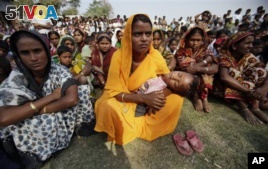March 06,2014
The World Health Organization says women's rights must be respected and protected when they seek contraception services. The WHO has issued new guidelines for policymakers and healthcare providers in conjunction with International Women’s Day on March 8.
The WHO estimates over 220 million women are not able to meet their needs for modern contraception. It says many are among the most vulnerable, including the poor, those living with HIV and women displaced by conflict or other causes.

In this photo taken Monday, Feb. 10, 2014, migrant villagers gather to attend the awareness and service camp under National Rural Health Mission at a very remote Baralakhaiti village on the sandbars of River Brahmaputra, about 70 kilometers (43 miles) north of Gauhati, India.
Dr. Marleen Temmerman is an obstetrician and director of the WHO’s Department of Reproductive Health and Research.
“It’s the first time that there is a guidance from the WHO where human rights is actually in the title – and not only in the title, but also in the content of the guidelines. We have guidelines for contraceptive use from the medical perspective looking at what is safe – what are the medical eligibility criteria – what [are] the contraindications and so on. But now we have worked towards ensuring human rights in the contraceptive guidelines,” she said.
The WHO has been developing the guidelines for the past year.
“We want to make sure that the human rights principles, such as acceptability, accessibility, affordability, choice, informed consent are high in the guidelines,” she said.
The guidelines recommend providing sexual and reproductive health services to women and girls, including family planning information and contraceptive methods.
Dr. Temmerman said that access to contraception has risen on the political agenda in recent years.
“If you look at the Millennium Development Goals, number five is to reduce maternal mortality. And that of course is linked to better care, better antenatal care, better delivery care, but also to the rights of a woman to decide when she will get pregnant – how many children she wants.”
She said millions of women must seek permission of their husbands to use contraception, while adolescent girls need permission from their parents or guardians. Many adolescent boys also lack access to modern contraception.
Temmerman said women and girls often have no power in deciding whether to become pregnant.
“Many women are coerced in their decision to be pregnant or not to be pregnant by their family, their father, the mother, the husband, the mother-in-law, the society, the community, by cultural and religious obstacles. But sometimes also by the governments, who are forcing tubal ligation, forcing sterilization onto some women and not giving access to others,” she said.
She added that teenage girls – who become pregnant – may face severe risks. The WHO estimates 16 million girls between 15 and 19 give birth each year. Nearly all the births are in low and middle income countries.
“We see a lot of pregnancy complications in adolescents that are really leading to a lot of mortality and morbidity, so a huge health burden,” said Temmerman.
The WHO reports some of the problems associated with negative outcomes for adolescent pregnancies include hemorrhaging, obstetric fistula, HIV and other sexually transmitted infections and mental disorders, such as depression.
Dr. Temmerman said countries where women and girls have access to modern contraception often fare better overall than countries that do not.
“I think what we have to do is to look at statistics. Those countries -- which are providing sexuality education and information to the population and to the youth in the schools – those countries which are providing adolescents and women-friendly services – have the lowest figures of unwanted pregnancies, maternal mortality and so on. So, health wise they do much better.”
She said besides the health benefits of investing in reproductive services, countries benefit economically by having a more productive workforce.
The new WHO guidelines say sexual and reproductive health services should help ensure “fully-informed decision-making and respect dignity, autonomy, privacy and confidentiality and be sensitive to individual needs.”